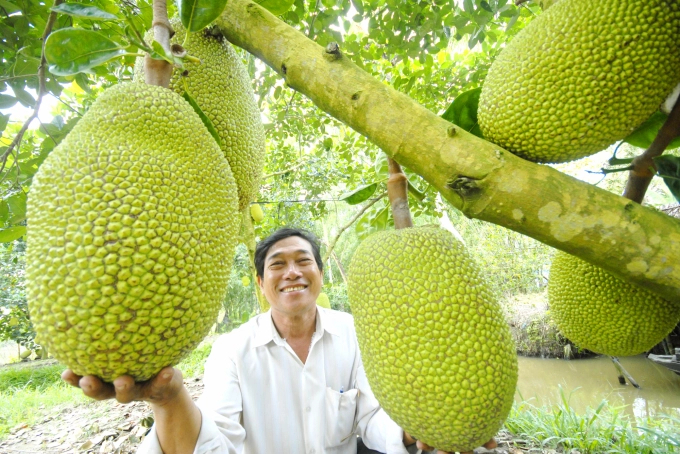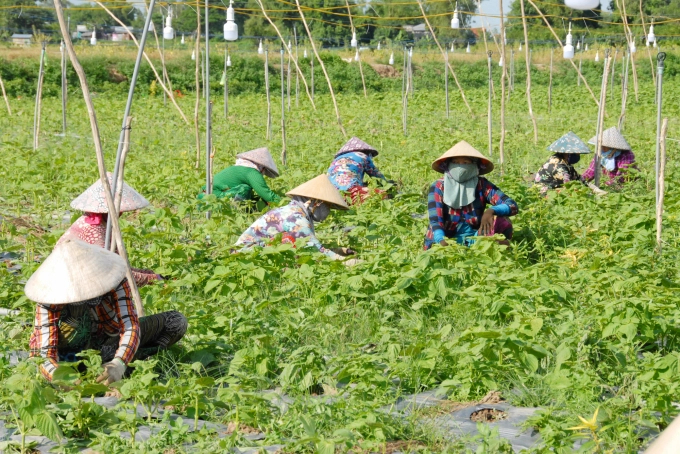June 16, 2025 | 02:37 GMT +7
June 16, 2025 | 02:37 GMT +7
Hotline: 0913.378.918
June 16, 2025 | 02:37 GMT +7
Hotline: 0913.378.918

An Giang Province plans to convert over 31,130 ha of rice-cultivation land in a stable direction this year. Photo: Le Hoang Vu.
The Mekong Delta province of An Giang has set a target to increase the area to grow fruit trees and vegetables in the next 10 years to more than 4 times compared to the current area.
Nguyen Si Lam Giam, head of the department said that the agricultural sector had been focusing on converting rice-cultivation land into the land to grow vegetables and fruit trees in the period 2017-2020, initially bringing positive results.
The province has converted a total of 21,613ha of rice-cultivation land into the land to plant vegetables and fruit trees so far, he said.
It was scheduled the province would convert about 31,130ha of rice-cultivation land into the land to grow vegetables and tree fruits by the end of this year, he said.
Statistics from the provincial Agriculture and Rural Development showed that the province now has 16,730 ha of fruit trees, about 1,305 ha higher than the same period last year.
Of which, the area to plant mango trees, durian trees, custard apple trees, jack trees, longan trees and citrus fruit trees have been recorded an increase of 641ha, 32ha, 272ha, 621ha, 386ha and 46ha respectively.
According to Lam, the total quantity of fruit harvested in the first nine months of this year was estimated to reach over 168,000 tonnes, including 119,600 tonnes of mango – an increase of 19,500 tonnes compared to the same period last year.
In the meantime, the whole province now reaches a total area of about 56,000 ha to grow vegetables. So far this year, the cultivated area is nearly 36,400ha, reaching 90.36 per cent of the schedule, he said.
Lam said despite the difficulties in linking chains to consume farm produce, growing vegetables and fruit trees still brought higher income for local farmers than growing rice.
The agriculture department would work with relevant sectors and agencies to adjust the conversion from rice-cultivation land into the land for growing vegetables and fruit trees to better suit with each districts’ planning in the province, he said.
Additionally, the department would also direct a flexible farming production in line with market requirements, he said.
Nguyen Ngoc Tung, a member of Khanh Hoa Longan Trees Co-operative, Chau Phu District said recently, the longan, grown in the district, was recently rated three stars by the provincial OCOP Farm Produce Rating and Evaluation Council.
“We are very happy about that,” he said.
It was believed to be a motivation encouraging us to convert rice-cultivation land into the land for growing fruit trees, he added.

An Giang Province has exceeded its target of converting rice-cultivation land into the land for growing vegetables and fruit trees in the period of 2017-2020. Photo: Le Hoang Vu.
Longan trees that were planted in the district often had large fruit with thick skin and more delicious than planting in other places, he said.
So, they could sell the longan fruit with a high price, he said.
A family could live well by money earning from a 1,000-sq.m longan garden, he said.
In Cho Moi District, local farmers of Gieng Island, also earned enough money to raise their families thanks to converting rice-cultivation land into the land for growing mango trees.
Due to the impact of COVID-19 pandemic, the selling price of mango has decreased recently.
However, the local farmers still have a higher income compared to rice cultivation thanks to promoting consumption in the domestic market.
As planned, 11 districts and towns of the province will convert 86,988ha of rice-cultivation land into the land for planting vegetables and fruit trees during 2021-2025, a vision towards 2030.
/2025/06/12/3721-2-202745_83.jpg)
(VAN) TH made an impression at Seoul Food 2025 with its line of natural beverages, paving the way for Vietnamese food products to enter the South Korean market.

(VAN) Soc Trang's success in rice exports stems from a strategy of developing fragrant and specialty rice cultivation areas and standardizing production toward low-emission practices.
/2025/06/11/1311-5-120811_839.jpg)
(VAN) The pig farming industry is facing the challenge of comprehensive restructuring to meet requirements for quality, safety, traceability, and market expansion both domestically and for export.

(VAN) Vietnam considers participating in ALGROALBA in order to expand agricultural production, coordinate the assessment and effective exploitation potential land.
/2025/06/05/5314-1-184727_407.jpg)
(VAN) From seemingly worthless fish scales and skin, enzymes and lactic ferments can transform by-products into peptides, opening a sustainable, effective business direction and elevating Vietnamese seafood.

(VAN) TTC AgriS and IFC signed a strategic partnership to develop a sustainable agricultural value chain, aiming to achieve the Net Zero target by 2035.

(VAN) Seafood by-products are opening a new path, combining green growth and technological innovation to enhance the industry's value.